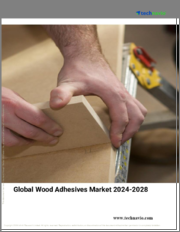
|
시장보고서
상품코드
1800978
목재 접착제 및 바인더 시장 보고서 : 제품 유형, 용도, 지역별(2025-2033년)Wood Adhesives and Binders Market Report by Product Type, Application, and Region 2025-2033 |
||||||
목재 접착제 및 바인더 세계 시장 규모는 2024년 181억 달러에 달했습니다. 향후 IMARC Group은 2033년까지 시장 규모가 250억 달러에 달하고, 2025-2033년 3.48%의 연평균 성장률(CAGR)을 보일 것으로 전망하고 있습니다.
목재 접착제 및 바인더는 두 개 이상의 목재 표면에 도포하여 결합시키는 고분자 재료입니다. 사용 편의성, 효율성, 경제성 등 최종 사용자에게 많은 이점이 있습니다. 또한, 오래 지속되는 결합력, 화학물질, 온도, 미생물에 대한 내성 등 다른 유익한 특성도 갖추고 있습니다. 천연소재와 합성소재가 있으며, 가구와 인조목재 제품 등 상업용과 주거용 모두에 활용되고 있습니다.
목재 접착제 및 바인더는 비용 효율적이고 내수성 및 내열성이 우수하기 때문에 주로 화석에서 추출한 폴리머로 제조됩니다. 그러나 환경 문제에 대한 관심이 높아지면서 최종 사용자는 바이오 폴리머를 사용한 친환경 제품으로 전환하고 있습니다. 또한, 일부 국가 정부는 다양한 제품 개발에 포름알데히드와 같은 유해 화학 물질의 사용에 대한 엄격한 규제를 시행하고 있으며, 이는 시장 성장을 강화하고 있습니다. 이에 따라 시장 관계자들은 휘발성 유기화합물(VOC) 함량이 낮은 신품종 생산에 주력하고 있습니다. 이와는 별도로, 건설 산업의 성장과 목재 가구의 사용 증가 추세는 전 세계적으로 목재 접착제 및 바인더에 대한 수요를 불러일으키고 있습니다. 이 외에도 문, 바닥재, 캐비닛, 창문 제조 및 조립을 포함한 산업적 용도 증가가 시장 성장을 뒷받침하고 있습니다.
본 보고서에서 다룬 주요 질문
- 목재 접착제 및 바인더 시장 규모는?
- 목재 접착제 및 바인더 시장 전망은?
- 목재 접착제 및 바인더 시장을 이끄는 주요 요인은?
- 목재 접착제 및 바인더 시장에서 가장 큰 점유율을 차지하는 지역은?
- 세계 목재 접착제 및 바인더 시장의 주요 기업은?
목차
제1장 서문
제2장 조사 범위와 조사 방법
- 조사 목적
- 이해관계자
- 데이터 소스
- 1차 정보
- 2차 정보
- 시장 추정
- 보텀업 접근
- 톱다운 접근
- 조사 방법
제3장 주요 요약
제4장 서론
제5장 세계의 목재 접착제 및 바인더 시장
- 시장 개요
- 시장 실적
- COVID-19의 영향
- 시장 예측
제6장 시장 분석 : 제품 유형별
- 요소 포름알데히드
- 멜라민-요소-포름알데히드
- 페놀-포름알데히드
- 이소시아네이트
- 대두 기반
- 기타
제7장 시장 분석 : 용도별
- 바닥재 제품
- 가구 및 서브 컴포넌트
- 창호
- 캐비닛
- 기타
제8장 시장 분석 : 지역별
- 북미
- 미국
- 캐나다
- 아시아태평양
- 중국
- 일본
- 인도
- 한국
- 호주
- 인도네시아
- 기타
- 유럽
- 독일
- 프랑스
- 영국
- 이탈리아
- 스페인
- 러시아
- 기타
- 라틴아메리카
- 브라질
- 멕시코
- 기타
- 중동 및 아프리카
제9장 SWOT 분석
제10장 밸류체인 분석
제11장 Porter의 Five Forces 분석
제12장 가격 지표
제13장 경쟁 구도
- 시장 구조
- 주요 기업
- 주요 기업 개요
- 3M Company
- Adhesives Research Inc.
- Ashland Global Specialty Chemicals Inc.
- Avery Dennison
- BASF
- Bostik(Arkema)
- Dow Chemical Company
- H.B. Fuller Company
- Henkel AG & Co. KGaA
- Huntsman Corporation
The global wood adhesives and binders market size reached USD 18.1 Billion in 2024. Looking forward, IMARC Group expects the market to reach USD 25.0 Billion by 2033, exhibiting a growth rate (CAGR) of 3.48% during 2025-2033.
Wood adhesives and binders are polymeric materials that are applied on the surface of two or more wood pieces to bind them. They offer numerous advantages to end users which include ease of use, efficiency and affordability. They also have other beneficial properties such as long-lasting bonds, and resistance against chemicals, temperature and microorganisms. They are available in natural and synthetic varieties and are utilized in both commercial and residential applications for making furniture and engineered wood products, among others.
Wood adhesives and binders are primarily produced from fossil-derived polymers as they are cost-effective and offer superior performance in terms of water and heat resistance. However, owing to the rising environmental concerns, end users are shifting toward green products that are manufactured using bio-based polymers. Moreover, governments in several countries are implementing stringent regulations against the usage of harmful chemicals like formaldehyde in the development of different products which, in turn, is strengthening the growth of the market. In line with this, market players are focusing on the production of new varieties that have a low content of volatile organic compounds (VOCs). Apart from this, the growing construction industry, in confluence with the rising trend of using wooden furniture, is catalyzing the demand for wood adhesives and binders around the world. In addition to this, increasing industrial applications, including the manufacturing and assembly of doors, flooring, cabinets, and windows, are supporting the market growth.
Key Market Segmentation:
Breakup by Product Type:
- Urea-Formaldehyde
- Melamine-Urea-Formaldehyde
- Phenol-Formaldehyde
- Isocyanates
- Soy-Based
- Others
Breakup by Application:
- Flooring Products
- Furniture and Subcomponents
- Windows and Doors
- Cabinets
- Others
Breakup by Region:
- North America
- United States
- Canada
- Asia Pacific
- China
- Japan
- India
- South Korea
- Australia
- Indonesia
- Others
- Europe
- Germany
- France
- United Kingdom
- Italy
- Spain
- Russia
- Others
- Latin America
- Brazil
- Mexico
- Others
- Middle East and Africa
Competitive Landscape:
The competitive landscape of the industry has also been examined with some of the key players being 3M Company, Adhesives Research Inc., Ashland Global Specialty Chemicals Inc., Avery Dennison, BASF, Bostik (Arkema), Dow Chemical Company, H.B. Fuller Company, Henkel AG & Co. KGaA, Huntsman Corporation, etc.
Key Questions Answered in This Report
- 1.How big is the wood adhesives and binders market?
- 2.What is the future outlook of wood adhesives and binders market?
- 3.What are the key factors driving the wood adhesives and binders market?
- 4.Which region accounts for the largest wood adhesives and binders market share?
- 5.Which are the leading companies in the global wood adhesives and binders market?
Table of Contents
1 Preface
2 Scope and Methodology
- 2.1 Objectives of the Study
- 2.2 Stakeholders
- 2.3 Data Sources
- 2.3.1 Primary Sources
- 2.3.2 Secondary Sources
- 2.4 Market Estimation
- 2.4.1 Bottom-Up Approach
- 2.4.2 Top-Down Approach
- 2.5 Forecasting Methodology
3 Executive Summary
4 Introduction
- 4.1 Overview
- 4.2 Key Industry Trends
5 Global Wood Adhesives and Binders Market
- 5.1 Market Overview
- 5.2 Market Performance
- 5.3 Impact of COVID-19
- 5.4 Market Forecast
6 Market Breakup by Product Type
- 6.1 Urea-Formaldehyde
- 6.1.1 Market Trends
- 6.1.2 Market Forecast
- 6.2 Melamine-Urea-Formaldehyde
- 6.2.1 Market Trends
- 6.2.2 Market Forecast
- 6.3 Phenol-Formaldehyde
- 6.3.1 Market Trends
- 6.3.2 Market Forecast
- 6.4 Isocyanates
- 6.4.1 Market Trends
- 6.4.2 Market Forecast
- 6.5 Soy-Based
- 6.5.1 Market Trends
- 6.5.2 Market Forecast
- 6.6 Others
- 6.6.1 Market Trends
- 6.6.2 Market Forecast
7 Market Breakup by Application
- 7.1 Flooring Products
- 7.1.1 Market Trends
- 7.1.2 Market Forecast
- 7.2 Furniture and Subcomponents
- 7.2.1 Market Trends
- 7.2.2 Market Forecast
- 7.3 Windows and Doors
- 7.3.1 Market Trends
- 7.3.2 Market Forecast
- 7.4 Cabinets
- 7.4.1 Market Trends
- 7.4.2 Market Forecast
- 7.5 Others
- 7.5.1 Market Trends
- 7.5.2 Market Forecast
8 Market Breakup by Region
- 8.1 North America
- 8.1.1 United States
- 8.1.1.1 Market Trends
- 8.1.1.2 Market Forecast
- 8.1.2 Canada
- 8.1.2.1 Market Trends
- 8.1.2.2 Market Forecast
- 8.1.1 United States
- 8.2 Asia Pacific
- 8.2.1 China
- 8.2.1.1 Market Trends
- 8.2.1.2 Market Forecast
- 8.2.2 Japan
- 8.2.2.1 Market Trends
- 8.2.2.2 Market Forecast
- 8.2.3 India
- 8.2.3.1 Market Trends
- 8.2.3.2 Market Forecast
- 8.2.4 South Korea
- 8.2.4.1 Market Trends
- 8.2.4.2 Market Forecast
- 8.2.5 Australia
- 8.2.5.1 Market Trends
- 8.2.5.2 Market Forecast
- 8.2.6 Indonesia
- 8.2.6.1 Market Trends
- 8.2.6.2 Market Forecast
- 8.2.7 Others
- 8.2.7.1 Market Trends
- 8.2.7.2 Market Forecast
- 8.2.1 China
- 8.3 Europe
- 8.3.1 Germany
- 8.3.1.1 Market Trends
- 8.3.1.2 Market Forecast
- 8.3.2 France
- 8.3.2.1 Market Trends
- 8.3.2.2 Market Forecast
- 8.3.3 United Kingdom
- 8.3.3.1 Market Trends
- 8.3.3.2 Market Forecast
- 8.3.4 Italy
- 8.3.4.1 Market Trends
- 8.3.4.2 Market Forecast
- 8.3.5 Spain
- 8.3.5.1 Market Trends
- 8.3.5.2 Market Forecast
- 8.3.6 Russia
- 8.3.6.1 Market Trends
- 8.3.6.2 Market Forecast
- 8.3.7 Others
- 8.3.7.1 Market Trends
- 8.3.7.2 Market Forecast
- 8.3.1 Germany
- 8.4 Latin America
- 8.4.1 Brazil
- 8.4.1.1 Market Trends
- 8.4.1.2 Market Forecast
- 8.4.2 Mexico
- 8.4.2.1 Market Trends
- 8.4.2.2 Market Forecast
- 8.4.3 Others
- 8.4.3.1 Market Trends
- 8.4.3.2 Market Forecast
- 8.4.1 Brazil
- 8.5 Middle East and Africa
- 8.5.1 Market Trends
- 8.5.2 Market Breakup by Country
- 8.5.3 Market Forecast
9 SWOT Analysis
- 9.1 Overview
- 9.2 Strengths
- 9.3 Weaknesses
- 9.4 Opportunities
- 9.5 Threats
10 Value Chain Analysis
11 Porters Five Forces Analysis
- 11.1 Overview
- 11.2 Bargaining Power of Buyers
- 11.3 Bargaining Power of Suppliers
- 11.4 Degree of Competition
- 11.5 Threat of New Entrants
- 11.6 Threat of Substitutes
12 Price Indicators
13 Competitive Landscape
- 13.1 Market Structure
- 13.2 Key Players
- 13.3 Profiles of Key Players
- 13.3.1 3M Company
- 13.3.1.1 Company Overview
- 13.3.1.2 Product Portfolio
- 13.3.1.3 Financials
- 13.3.1.4 SWOT Analysis
- 13.3.2 Adhesives Research Inc.
- 13.3.2.1 Company Overview
- 13.3.2.2 Product Portfolio
- 13.3.3 Ashland Global Specialty Chemicals Inc.
- 13.3.3.1 Company Overview
- 13.3.3.2 Product Portfolio
- 13.3.4 Avery Dennison
- 13.3.4.1 Company Overview
- 13.3.4.2 Product Portfolio
- 13.3.4.3 Financials
- 13.3.4.4 SWOT Analysis
- 13.3.5 BASF
- 13.3.5.1 Company Overview
- 13.3.5.2 Product Portfolio
- 13.3.5.3 Financials
- 13.3.5.4 SWOT Analysis
- 13.3.6 Bostik (Arkema)
- 13.3.6.1 Company Overview
- 13.3.6.2 Product Portfolio
- 13.3.7 Dow Chemical Company
- 13.3.7.1 Company Overview
- 13.3.7.2 Product Portfolio
- 13.3.8 H.B. Fuller Company
- 13.3.8.1 Company Overview
- 13.3.8.2 Product Portfolio
- 13.3.8.3 Financials
- 13.3.8.4 SWOT Analysis
- 13.3.9 Henkel AG & Co. KGaA
- 13.3.9.1 Company Overview
- 13.3.9.2 Product Portfolio
- 13.3.9.3 Financials
- 13.3.9.4 SWOT Analysis
- 13.3.10 Huntsman Corporation
- 13.3.10.1 Company Overview
- 13.3.10.2 Product Portfolio
- 13.3.10.3 Financials
- 13.3.10.4 SWOT Analysis
- 13.3.1 3M Company



















